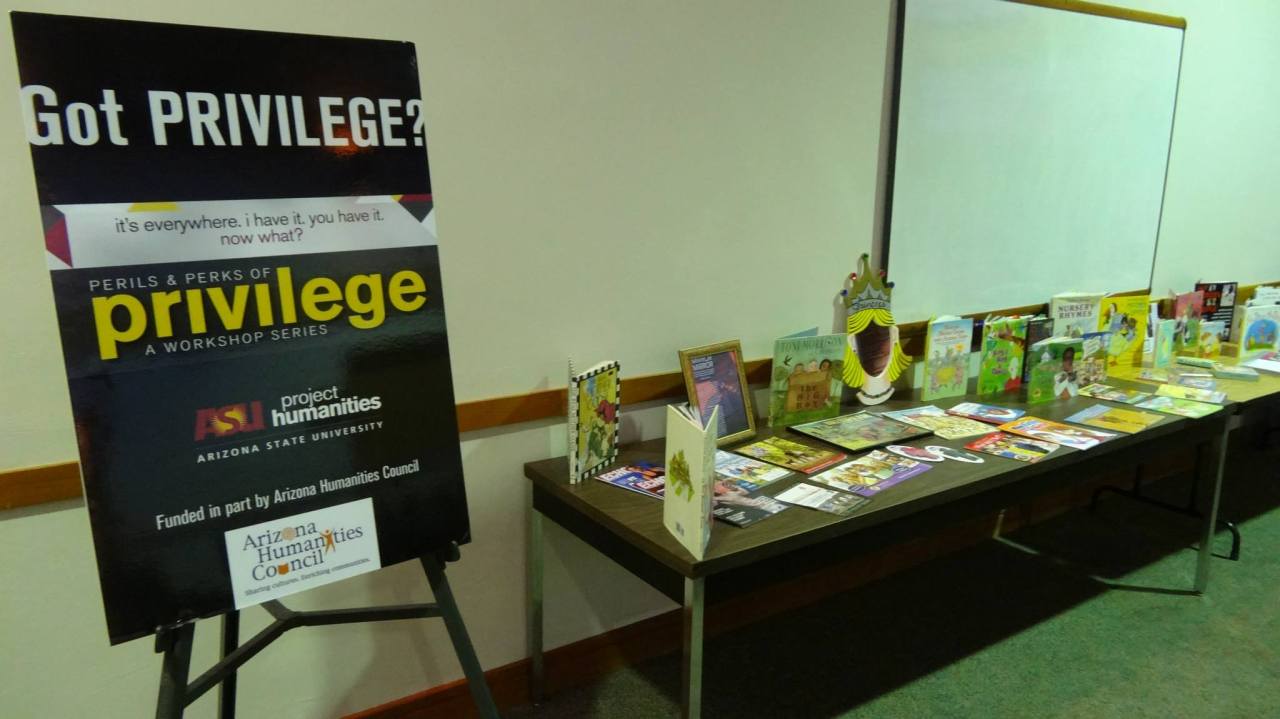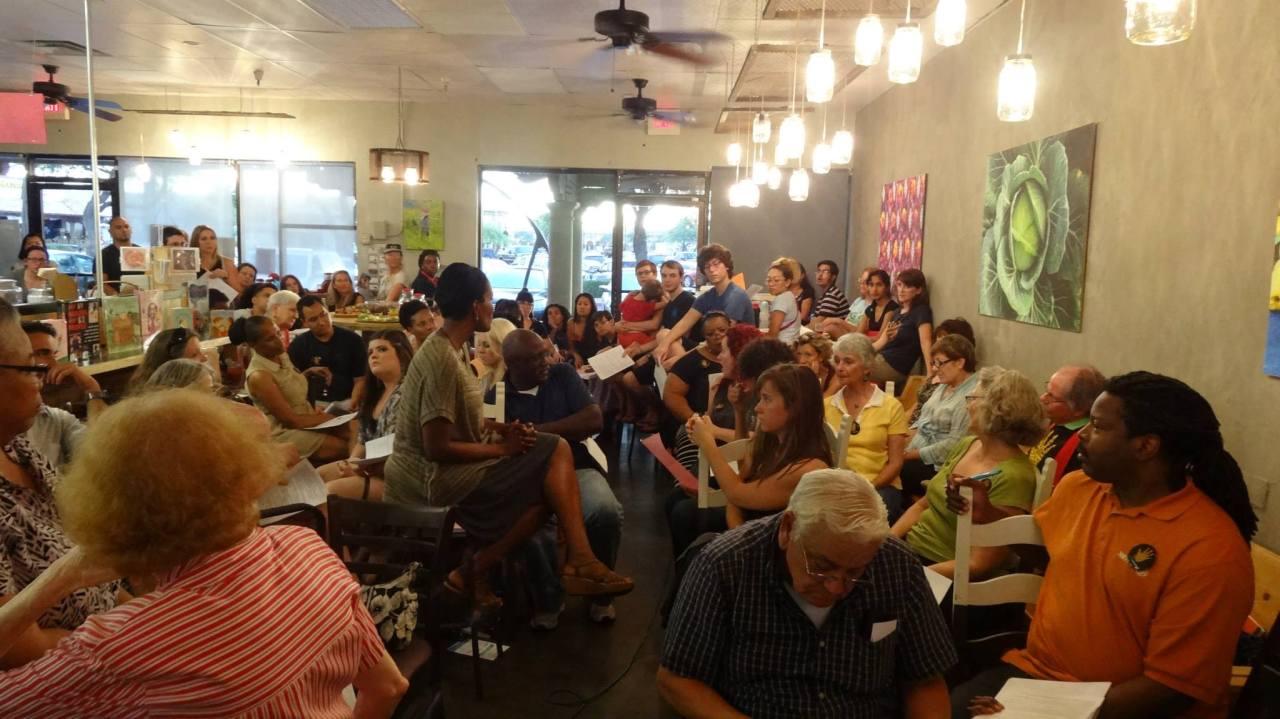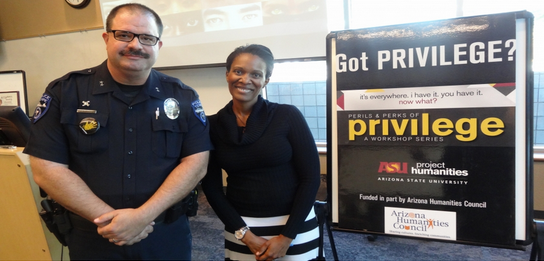Tuesday, October 21, 2014
My mother is a woman of many words. Many repeated words, actually. And it's ironic that her daughter, of all people, writes on a blog about privilege because if I were to make a guess, I'd say her top words are (next to "Chicana") rich, white, and privilege. And just to clarify for those who aren't living in Mesa, Arizona, these three words are basically interchangeable. The members of this community are, for the most part, very affluent and predominately white. As a Hispanic family who struggles to keep above the poverty line, the members of my household are, on paper, a clear minority. Off paper, when it comes to my sisters and I, not so much, but we'll dive more into this one another week. For now, the focus is my mother who, over the years, I have discovered an overwhelming bitterness in, especially for the rich, white members of our community.
It's through this bitterness that "privilege" was introduced to me as a dirty word. After my parents divorced, I was taught that we were fighting against every light skinned, nicely dressed lady I bumped into on the street because it is the privileged that are giving us dirty looks, the privileged cutting us off in the school parking lot, the privileged taking all of the good part-time jobs, the scholarships, the everything-that-is-affordable just because they have the money to take what is theirs. Our lives were hard, but it was the privileged who were oppressing us. At least, that's what I was taught.
It's through this bitterness that "privilege" was introduced to me as a dirty word. After my parents divorced, I was taught that we were fighting against every light skinned, nicely dressed lady I bumped into on the street because it is the privileged that are giving us dirty looks, the privileged cutting us off in the school parking lot, the privileged taking all of the good part-time jobs, the scholarships, the everything-that-is-affordable just because they have the money to take what is theirs. Our lives were hard, but it was the privileged who were oppressing us. At least, that's what I was taught.
Is teaching your children that wrong? Yes.
And yet, it all feels completely justified. My mom is a Hispanic who grew up in Arizona, a part of a generation that forgot how to speak Spanish because their bilingual, bruised parents told them English was the only safe thing to speak. We moved to Mesa, Arizona proven to be the most conservative city in the U.S. in the heat of SB1070. Discrimination is not just the occasional supermarket bigot, it is something that fills the desert air, makes it thick and suffocates the minority. My mom knows that well enough to fully warrant her bitterness. And further, how can a woman, a mother, not feel bitter about her own financial crisis when her children are surrounded by a pool of students more comfortable than they ever could be? When MORE is a tangible, but untouchable reality swinging in front of her face on a a day-to-day basis?
The way she feels, it makes sense.
But is it right?
That is the question I am posing today. And my opinion is that, when it comes to Privilege Profiling, empathy is the only thing that can really be extended in this situation. I can understand why my mother says what she does, but that doesn't make it okay to say that my white friends are incapable of extending good manners because their "privlege parents" never taught them to. You don't have to be a fan of privilege. And if you don't have a godlike sense of patience for the privileged, that's okay too. However, letting your viewpoint on privilege affect the way you view and treat people with privilege is not okay.
Privilege is just another way that we are all different, and, as said before, differences are to de embraced.
But that's just my take on it.
What do you think?
Tuesday, October 7, 2014
On 6:00 PM by Unknown in Rachel Sondgeroth 1 comment
College, College, College!!!
As a senior in high school, college readiness is constantly being thrown in my face, and because of this college never stops coming up. This week, my AP English teacher had us organize our college portfolios, making the topic as incessant as ever. Throughout the week, I overheard a lot of interesting questions and comments, and I felt like sharing a couple of them on this blog:
"I'm supposed to write an "adversity essay" for _____University, but nothing bad has ever happened to me. It's really unfortunate to be a middle class white girl."
"Like, I get why minorities get all the scholarships, but it's still really unfair."
"My parents make too much money for me to get financial aide. It sucks."
Initially, I was a little annoyed by these statements, especially since I knew for a fact that all of these 'quotees' were fairly well off, but, after mulling it over for a while, I thought back to the name of the privilege workshop Project Humanities held this summer: The Perils and Perks of Privilege. When we hear the word privilege, the first, and usually only, thing we think about are the perks. By having privilege, we avoid a multitude of conflicts in our life, be it depression, discrimination, financial instability ect. ect, we all dodge some kind of bullet in some way. But what about the perils? How does our privilege put us at a loss?
Here's a hint: It has nothing to do with scholarships.
The greatest disadvantage our privilege causes us is a lack of understanding for others. So many times, we simply focus on the problems that occur within the context of our own privilege. "Yes, I have had an incredibly easy life, but I have little life experience because of it." "Yes, I am middle class, but I'm afraid of student loans too." And it's perfectly normal and acceptable to think like this; however, when one acknowledges the perils of their own privilege without acknowledging other's disadvantages, it marginalizes specific groups of society. This is clearly seen through my classmates' quotes. This marginalization causes these groups of people to be neglected, which is bad in of itself. However, if this mentality goes untreated, it can evolve into prejudice, which can not only cause minorities (and I'm not just talking about racial or cultural minorities here) to be neglected, but create obstacles towards breaking through any disadvantages that come with being a part of their minority.
How can prevent this from happening?
Embracing the diversity in society is one thing, and it is a good thing, but we could be doing so much more. Try looking at the people around you, and then yourself, and then try to think of all the ways that your privilege makes you a part of the problem. Are there any privileges that you have that blind you from understanding the suffering of others? Then, go beyond bias. Think of ways to be a part of the solution. This is a responsibility of all of us, not just those new to privilege. We can't change the fact that we're all different, but we can change how these differences impact each other's lives. All men were not created the same, but they were created equal, and its time that the community demonstrates this.
As a senior in high school, college readiness is constantly being thrown in my face, and because of this college never stops coming up. This week, my AP English teacher had us organize our college portfolios, making the topic as incessant as ever. Throughout the week, I overheard a lot of interesting questions and comments, and I felt like sharing a couple of them on this blog:
"I'm supposed to write an "adversity essay" for _____University, but nothing bad has ever happened to me. It's really unfortunate to be a middle class white girl."
"Like, I get why minorities get all the scholarships, but it's still really unfair."
"My parents make too much money for me to get financial aide. It sucks."
Initially, I was a little annoyed by these statements, especially since I knew for a fact that all of these 'quotees' were fairly well off, but, after mulling it over for a while, I thought back to the name of the privilege workshop Project Humanities held this summer: The Perils and Perks of Privilege. When we hear the word privilege, the first, and usually only, thing we think about are the perks. By having privilege, we avoid a multitude of conflicts in our life, be it depression, discrimination, financial instability ect. ect, we all dodge some kind of bullet in some way. But what about the perils? How does our privilege put us at a loss?
Here's a hint: It has nothing to do with scholarships.
The greatest disadvantage our privilege causes us is a lack of understanding for others. So many times, we simply focus on the problems that occur within the context of our own privilege. "Yes, I have had an incredibly easy life, but I have little life experience because of it." "Yes, I am middle class, but I'm afraid of student loans too." And it's perfectly normal and acceptable to think like this; however, when one acknowledges the perils of their own privilege without acknowledging other's disadvantages, it marginalizes specific groups of society. This is clearly seen through my classmates' quotes. This marginalization causes these groups of people to be neglected, which is bad in of itself. However, if this mentality goes untreated, it can evolve into prejudice, which can not only cause minorities (and I'm not just talking about racial or cultural minorities here) to be neglected, but create obstacles towards breaking through any disadvantages that come with being a part of their minority.
How can prevent this from happening?
Embracing the diversity in society is one thing, and it is a good thing, but we could be doing so much more. Try looking at the people around you, and then yourself, and then try to think of all the ways that your privilege makes you a part of the problem. Are there any privileges that you have that blind you from understanding the suffering of others? Then, go beyond bias. Think of ways to be a part of the solution. This is a responsibility of all of us, not just those new to privilege. We can't change the fact that we're all different, but we can change how these differences impact each other's lives. All men were not created the same, but they were created equal, and its time that the community demonstrates this.
Subscribe to:
Comments (Atom)
Search
Popular Posts
-
This weekend everyone on my Facebook feed seemed to be up in arms over Jaden Smith wearing a dress to coachella. I don't really und...
-
Last week I came across an article arguing that the word "thug" is the new "n----r." Could this be true? This ...
-
Earlier this week Disney released its design for their first Latina princess ever. Corks were blown off of campaign bottles, parades fill...
Powered by Blogger.


